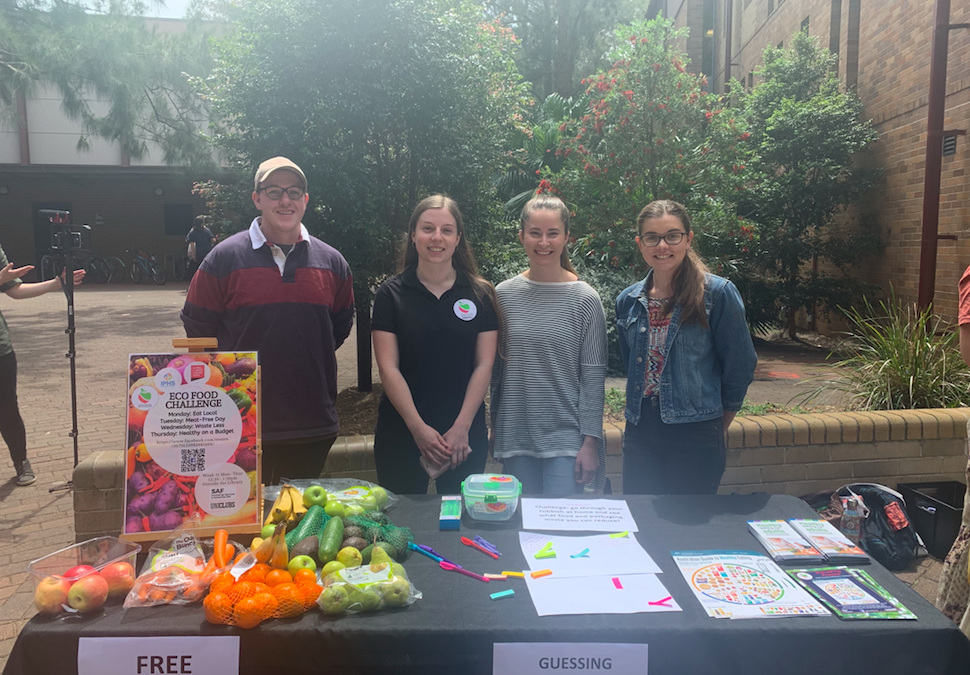Students have been encouraged to take on the challenge of reducing food waste as part of Global Climate Change week at the University of Wollongong.
The ‘Eco Food Challenge’ is a four-day program run by the Illawarra Public Health Society and UOW Nutrition and Dietetics Association.
UOW president of the Nutrition and Dietetics Association, Emily Munro said the challenge aims to raise awareness about what students are eating and draw attention to the environmental impacts our diets have on climate change.
“One of the sustainable development goals is that we need to halve our food waste, so we are looking at reducing environmental impact from diet,” Ms Munro said.
“It’s important to be more aware of what you are eating and what’s best for environmental health, as well as your own health.”
The Eco Food Challenge was one of many workshops run by UOW to teach students how to reduce their impact on the environment.
Australian Youth Climate Coalition UOW president, Claire Rodgers is optimistic about the impact of the week-long campaign.
“I think it’s important to raise awareness on campus because it reaches an audience of young people studying for our future, a future which is inevitably going to be impacted by the effects of climate change,” Ms Rodgers said.
“As students we are powerful in that we have the capacity to change the culture and thinking around our environmental and social impact.”
She believes that the program should run longer than a week in order to enact effective change.
“After this week I hope people take the initiative to both educate themselves on the climate crisis and the social and environmental issues around it and take one further step by getting actively involved in the climate justice movement,” Ms Rodgers said.
“There are so many organisations playing different roles in building the movement, from AYCC, to Greenpeace, to Extinction Rebellion, so it’s worth taking a look at which group best aligns with your values and going for it.”
A range of workshops were on offer to students for the duration of Global Climate Change Week.
Each fortnight Hidden Harvest rescues food from local producers that would otherwise go to waste and puts on a community dinner, run entirely by volunteers. The ‘pay-as-you-feel’ event combines the arts and education, by teaching the community about the hidden costs associated with food waste.
TWEETS:
“As students, we are powerful in that we have the capacity to change the culture and thinking around our environmental and social impact” – Claire Rodgers, President of the UOW AYCC talks about the power of students #GlobalClimateChangeWeek @UOWTV #socialj
— Emily Jol (@emilyjol_) October 27, 2019
https://platform.twitter.com/widgets.js
Student involvement in #GlobalClimateChangeWeek has been high but it’s important that engagement in sustainable practice continues long term explains Claire Rodgers, President of the UOW @AYCC. @UOWTV #socialj
— Emily Jol (@emilyjol_) October 27, 2019
https://platform.twitter.com/widgets.js
“One of the sustainable development goals is that we need to halve food waste so we are looking at reducing environmental impact from diet,” said Emily Munro, Eco Food Challenge Organiser. @UOWTV #socialj
— Emily Jol (@emilyjol_) October 27, 2019
https://platform.twitter.com/widgets.js
The @UOWNutrDiet Association challenged students to an ‘Eco Food Challenge’ to raise awareness about the financial and environmental cost of food waste for #GlobalClimateChangeWeek @UOWTV #socialj pic.twitter.com/dixkkiETja
— Emily Jol (@emilyjol_) October 27, 2019
https://platform.twitter.com/widgets.js
‘Wasted Wednesday’ community dinners run by Hidden Harvest each fortnight aim to give Wollongong locals the tools they need to minimise food waste in the home. Stay tuned for more! @UOWTV #socialj pic.twitter.com/o0P4tbsZGy
— Emily Jol (@emilyjol_) October 27, 2019


